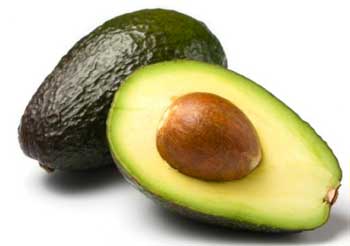 Avocados may be a high fat fruit (15%), but they are surprisingly good for you. Not only do they have a high nutritional value, they also offer numerous health benefits. Avocados can give you better-looking, more healthy skin, can protect against certain life-endangering illnesses, and are even credited with the power to help the eater lose weight.
Avocados may be a high fat fruit (15%), but they are surprisingly good for you. Not only do they have a high nutritional value, they also offer numerous health benefits. Avocados can give you better-looking, more healthy skin, can protect against certain life-endangering illnesses, and are even credited with the power to help the eater lose weight.
So if you thought avocado’s greatest gift to the world was the Mexican dip “guacamole”, think again.
Some Nutritional Facts
Table of Contents
A 100g of avocado contains about 160 calories. Around 120 of those calories are provided by healthy fats, most of which are monounsaturated—the “good fat” that can lower cholesterol levels.
An average avocado is also 2% protein. That sound pretty low, but it’s quite high for a fruit and avocados are often used as a substitute for meat in vegetarian recipes. Its protein content may be high for a fruit, but compared with other fruits the sugar percentage is very low. An average-size avocado contains less than 0.5g of sugar.
Avocados are also high in dietary fiber. A medium-size fruit can provide nearly half the recommended daily amount. Research has proven people who have sufficient fiber in their diet are less likely to develop cancer, so anything that increases the daily fiber intake is a good thing and it is also worth noting that eating plenty of fiber can promote a feeling of fullness that naturally suppresses the appetite.
A 100g serving of avocado significantly contributes to the recommended daily amounts (RDA) of several valuable vitamins and minerals:
| Vitamin K (26% RDA) | Vitamin B5 (14% RDA) |
| Folate (20% RDA) | Vitamin B6 (13% RDA) |
| Vitamin C (17% RDA) | Vitamin E (10% RDA) |
| Potassium (14% RDA) |
In less significant amount a 100g serving of avocado also provides:
| Magnesium | Manganese |
| Copper | B1 (Thiamine) |
| Iron | B2 (Riboflavin) |
| Zinc | B3 (Niacin) |
| Phosphorous |
Avocados v Cholesterol
According to a study published in the Archives of Medical Research eating “an avocado-enriched diet can improve lipid profile in healthy and especially in mild hypercholesterolemic [high cholesterol] patients, even if hypertriglyceridemia (combined hyperlipidemia) is present.” It all sound a little technical, but in layman’s terms the researchers discovered avocados can kick cholesterols ass, and after two weeks of eating the “avocado-enriched” diet the researchers recorded a 22% decrease in bad cholesterol, accompanied by an 11% increase in good cholesterol.
Avocados v Body Fat
Numerous studies confirm the fat-busting prowess of avocado. According to one of the more recent studies (published in the Nutrition Journal) eating half an avocado at lunchtime can curb the appetite and prevent afternoon snacking. The study also suggests avocado has the power to regulate blood sugar levels. If this is so they could be an equally healthy food choice for diabetics.
Avocados v Cancer
The flesh of the avocado is rich in phytochemicals that are believed to protect against certain forms of cancer. In one study, the researchers looked at the “chemopreventive” characteristics of the fruit and noted: “individual and combinations of phytochemicals from the avocado fruit may offer an advantageous dietary strategy in cancer prevention.”
In another study, published in the Journal of Nutrition, the researchers looked at the cancer-fighting abilities of foods that are rich in carotenoids (carrots, tomatoes, dark leafy greens) and discovered consuming them along with monounsaturated fat-rich avocados can enhance the bioavailability of the nutrients. This is a noteworthy discovery because another study, published in the Journal of Nutritional Biochemistry, suggests carotenoids interfere with the growth of androgen-dependent and androgen-independent prostate cancer cells.
A number of other studies are also very supportive of avocado’s anti-cancer abilities.
Avocados V Metabolic Syndrome
Metabolic syndrome is name used to refer to a group of symptoms that can increase the likelihood of diabetes, stroke, and/or coronary artery disease. The Nutrition Journal published the results of an interesting study that suggests eating avocado can reduce the risk of the syndrome along with all the negative connotations it entails. At the end of the study the researchers concluded: “Avocado consumption is associated with improved overall diet quality, nutrient intake, and reduced risk of metabolic syndrome. Dietitians should be aware of the beneficial associations between avocado intake, diet and health when making dietary recommendations.”
Further Considerations
Anyone searching for ways to eat their way to better health would be well advised not to overlook the nutritional benefits of avocado, but like any other food avocado may cause allergic reactions in a minority of people. According to a report published in Allergy, Asthma & Clinical Immunology symptoms of avocado allergy may include “coughing, wheezing, nasal stuffiness, generalized urticaria and periorbital edema.” It must be stressed, however, that such reactions are extremely rare and allergies to avocado are no more or less likely that allergies to any other fruit.
Leave a Reply